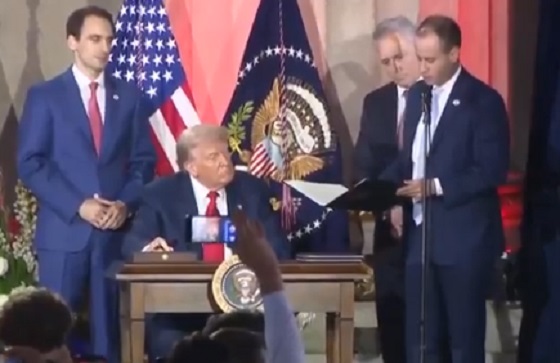Business
Congressional Republicans introduce bill targeting riot funders

Los Angeles Police struggled to maintain order Saturday night as fires and destruction continued.
From The Center Square
By
Senators from Alabama, Missouri, NC, Tenn., Texas, Utah want to expand RICO
U.S. Sen. Ted Cruz, R-Texas, and several Republican cosponsors, introduced the Stop Financial Underwriting of Nefarious Demonstrations and Extremist Riots (Stop FUNDERs) Act to hold accountable financiers of rioters and vandals.
The one page bill would amend 18 U.S.C. § 1961(1) to add “rioting,” as defined in the Anti-Riot Act, to the list of racketeering predicate offenses. Doing so would enable the Department of Justice “to use the full suite of RICO tools against entities who fund or coordinate violent interstate riots,” Cruz said.
He’s referring to the Racketeer Influenced and Corrupt Organizations Act, which allows for extended criminal penalties for those involved in racketeering. Racketeering involves “any act or threat involving murder, kidnapping, gambling, arson, robbery, bribery, extortion, dealing in obscene matter, or dealing in a controlled substance or listed chemical,” as well as numerous fraud-related crimes, including gambling, mail fraud, wire fraud, immigration fraud, among others, Cornell Law School’s Legal Information Institute explains.
“Every American has the right to freedom of speech and peaceful protest, but not to commit violence. Domestic NGOs and foreign adversaries fund and use riots in the United States to undermine the security and prosperity of Americans,” Cruz said.
His bill would give the DOJ added RICO tools that could be used against organizations and individuals who repeatedly fund or coordinate violent interstate riots. They include joint liability and group prosecution, conspiracy charges, asset forfeiture, and enhanced criminal penalties, Cruz said. The goal is also to “deter abuse of nonprofit status and expose hidden financial pipelines behind politically motivated violence,” he said.
Only Republicans in the Senate signed on as cosponsors: Sens. John Cornyn of Texas, Tommy Tuberville of Alabama, Bill Hagerty of Tennessee, Thom Tillis of North Carolina, Mike Lee of Utah and Josh Hawley of Missouri.
“Radical, left-wing groups who fund acts of violence, coordinate attacks against law enforcement, and spearhead the destruction of property must be stopped,” Cornyn said. “This legislation would add rioting to the list of racketeering offenses to crack down on this lawless behavior while ensuring the First Amendment rights of free speech and peaceful protest are protected.”
U.S. Rep. Beth Van Duyn, R-Texas, filed companion legislation in the House.
“It is time we empower our law enforcement with a commonsense tool to treat these violent mobs, their funding sources, and their organizers as the criminal enterprises they are by passing the Stop FUNDERS Act,” she said. “Since the days of the George Floyd riots, to the violence we see across American cities and college campuses today, it is obvious there are well funded, well outfitted, and highly coordinated efforts to plan and execute violent and potentially deadly missions of chaos and mayhem. This is organized crime, and we need to attack it as such.”
The bill was filed after organized anti-Israel riots exploded across college campuses nationwide after the Oct. 7, 2023. Hamas terrorist attack against Israel. Training manuals were published by pro-Palestinian groups to take over U.S. college campuses, rioters targeted Jewish students, locked them out of classrooms and buildings and physically assaulted them, resulting in lawsuits and congressional investigations.
Under President Donald Trump, Ivy League colleges where significant antisemitism was reported were threatened with losing hundreds of millions of dollars of taxpayer money, accreditation, cancellation of visa approvals among other actions if they didn’t change their policies to protect Jewish students. In response, some universities sued, others complied.
Cruz, Hawley and others also called for foreign students’ visas to be revoked who were involved in riots and advocating antisemitism, a policy their former colleague and now Secretary of State Marco Rubio began implementing.
More recently, riots against ICE officers in the last few months also appear to be coordinated and financed by several groups, prompting a Department of Justice investigation. Hawley is leading an investigation into the anti-ICE riots in Los Angeles, arguing the violence wasn’t “spontaneous.”
Within the first six months of the Trump administration, attacks against ICE officers have increased by 830% from California to Nebraska to New York, The Center Square reported.
Recent examples include threats to kill or physically harm federal agents and their family members, with recent shootings targeting ICE officers and Border Patrol facilities in Texas, and ICE officers in California and New York, The Center Square reported.
Alberta
Albertans should question any calls for more money from municipal governments

From the Fraser Institute
By Ben Eisen and Austin Thompson
In Cochrane, an ordinary park bench costs between $5,000 and $7,000. The City of Calgary will spend $515 million of taxpayer money to build a new arena for the Flames. Edmonton fire stations cost 63 per cent more than comparable facilities elsewhere—an independent report suggests “the largest portion of the cost premium… is attributed to the City of Edmonton’s Climate Resilience policy.”
According to our recent study, from 2008 (the earliest year of available data) to 2023 (the latest year of data), total spending by municipal governments around the province increased from $3,187 per person to $3,750. That’s an increase of 18 per cent (inflation-adjusted). During the same period, total municipal property tax revenue increased by 13 per cent (inflation-adjusted).
In light of these spending and tax increases, it’s fair to ask—have your local municipal services improved in recent years?
Well, it depends on who you ask. But a 2025 survey conducted by the City of Calgary found that only 46 per cent of residents said they receive “good” value for their property tax dollars (rather than “neutral” or “poor”). Satisfaction with the overall level and quality of municipal services declined from 76 per cent in 2017 to 61 per cent in 2025. And only about 9 per cent of Calgarians want the city to increase taxes beyond the current inflation rate to expand services, with the rest preferring to maintain or reduce taxes.
Albertans in other municipalities share similar concerns. According to a 2024 city survey, the vast majority of Edmontonians said winter road maintenance is “very important” but only 45 per cent report being satisfied with this municipal service. And according to a 2023 survey of citizen satisfaction, only 11 per cent of the residents of Grande Prairie County want to “increase taxes to expand services.”
Meanwhile, evidence of municipal waste is not hard to find.
In Cochrane, an ordinary park bench costs between $5,000 and $7,000. The City of Calgary will spend $515 million of taxpayer money to build a new arena for the Flames—this is splashy corporate welfare with dubious public benefits. Edmonton fire stations cost 63 per cent more than comparable facilities elsewhere—an independent report suggests that “the largest portion of the cost premium… is attributed to the City of Edmonton’s Climate Resilience policy.”
In short, municipal spending has increased significantly but many Albertans do not see how this increase translated into better services that have improved their lives. This should make taxpayers and senior levels of governments skeptical of claims from municipalities that they need even more money to help deliver core services. (For example, Alberta’s municipalities claim they need an additional $30 billion to maintain local infrastructure such as roads, wastewater systems and recreational facilities.)
Are you getting good value for your property tax dollars? For many Albertans, the answer appears to be “no.” Until municipalities can demonstrate that existing resources are being used effectively, calls for even more funding should be met with healthy skepticism.
Artificial Intelligence
Trump signs executive orders to strip AI of woke bias

Quick Hit:
At an AI summit in Washington on Wednesday, President Donald Trump signed three executive orders aimed at making the U.S. an “AI export powerhouse” while purging federally funded artificial intelligence models of what he called “woke Marxist lunacy.”
Key Details:
- During remarks at the “Winning the Race” summit, Trump declared: “Once and for all, we are getting rid of woke. Is that OK?” drawing loud applause. He slammed DEI as “toxic ideology” that distorts AI outputs and pledged to eliminate it from all AI tools funded by the federal government.
- One order requires that federally funded AI models be politically neutral, explicitly banning ideological components such as DEI, critical race theory, and so-called unconscious bias. The move pressures developers seeking government contracts to strip their models of left-leaning programming.
- The other orders speed up permitting for AI infrastructure and promote U.S. exports of AI tools. Trump said the initiative is essential to counter China’s ambitions in the sector and called on American companies to “put America first” in the global AI race.
President Trump signs three executive orders on AI:
— Accelerating permitting to build data center infrastructure
— Promoting the export of American AI models abroad
— Protecting Americans from woke AI models driven by Radical Left ideology at the expense of accuracy pic.twitter.com/nxxWi36isL— Rapid Response 47 (@RapidResponse47) July 23, 2025
Diving Deeper:
President Donald Trump on Wednesday signed three sweeping executive orders focused on reshaping the U.S. approach to artificial intelligence, taking aim at what he described as entrenched liberal bias in the industry and ramping up efforts to dominate the global AI landscape.
Speaking from the “Winning the Race” summit in Washington, Trump mocked left-wing influence in AI, decrying what he called “woke Marxist lunacy” embedded in today’s leading models. “Once and for all, we are getting rid of woke. Is that OK?” he said to a room of industry leaders gathered at the Mellon Auditorium. The crowd responded with loud applause.
One of the executive orders, titled Preventing Woke AI in the Federal Government, directs that any company receiving federal funding for artificial intelligence must develop politically neutral systems that are free from “ideological dogmas such as DEI.” The order explicitly targets concepts like critical race theory, systemic racism, transgenderism, intersectionality, and unconscious bias—labeling them as distortions of factual output.
Trump also blasted the Biden administration for previously mandating “toxic diversity, equity, and inclusion ideology” as the framework for federal AI development. “So you immediately knew that was the end of your development,” he said, drawing laughs from the crowd.
The order emphasizes that the government “should be hesitant to regulate” private-sector AI models but makes clear that public procurement must be grounded in “truthfulness and accuracy” rather than political goals.
Trump also signed a second order aimed at reducing permitting delays for data centers and scaling back environmental rules that could slow construction. These facilities, which consume vast amounts of energy and water, have drawn criticism from environmental groups and resistance from local communities. The order aligns with calls from major tech companies to ease restrictions on building out AI infrastructure.
A third order prioritizes expanding U.S. AI exports and positions America as a global leader in the emerging sector. The moves accompany the rollout of a 24-page “AI action plan” from the White House, designed to replace Biden-era rules and accelerate AI development by cutting “red tape and onerous regulation.”
“Winning this competition will be a test of our capacities unlike anything since the dawn of the space age,” Trump said. “We need U.S. technology companies to be all-in for America. We want you to put America first.”
He even joked about renaming the technology altogether, saying, “I don’t even like the name… It’s not artificial. It’s genius.”
The Trump administration’s directives come as concerns grow on the right over political bias in AI, especially in generative tools like chatbots and image generators. Elon Musk, a vocal critic of “woke” AI, has pledged to build a politically neutral alternative through his xAI company. His chatbot, Grok, has been accused of promoting antisemitic and white supremacist content in recent months, including pro-Nazi posts and conspiracy theories—leading to internal corrections.
-

 Addictions2 days ago
Addictions2 days agoToronto offering free drug kits with pipes, syringes across city
-

 Alberta23 hours ago
Alberta23 hours ago$602,000 of contraband tobacco seized in Red Deer
-

 COVID-192 days ago
COVID-192 days agoAmerican lawyer calls on Trump to sanction Canada if Freedom Convoy leaders are jailed
-

 espionage1 day ago
espionage1 day agoDays Ahead of Critical Vote, Taiwan Accuses China of ‘Unprecedented’ Election Interference
-

 Alberta4 hours ago
Alberta4 hours agoAlbertans should question any calls for more money from municipal governments
-

 Frontier Centre for Public Policy1 day ago
Frontier Centre for Public Policy1 day agoThe RCMP Used To Uphold The Law. Now It’s Enforcing An Ideology
-

 Health2 days ago
Health2 days agoPatients are being taken for organ retrieval while still alive
-

 COVID-191 day ago
COVID-191 day agoProsecutors claim Lich, Barber led occupation of Ottawa during Freedom Convoy protests






